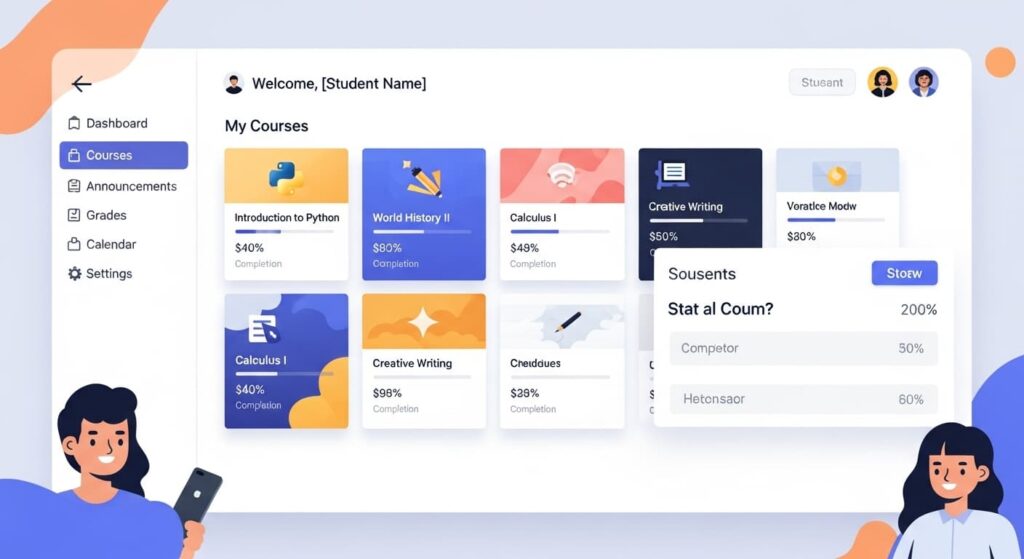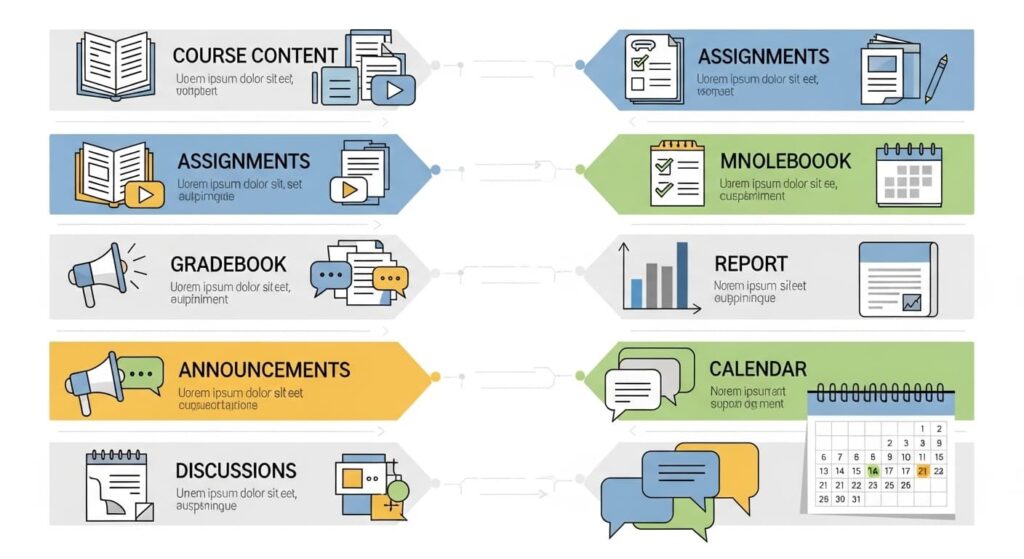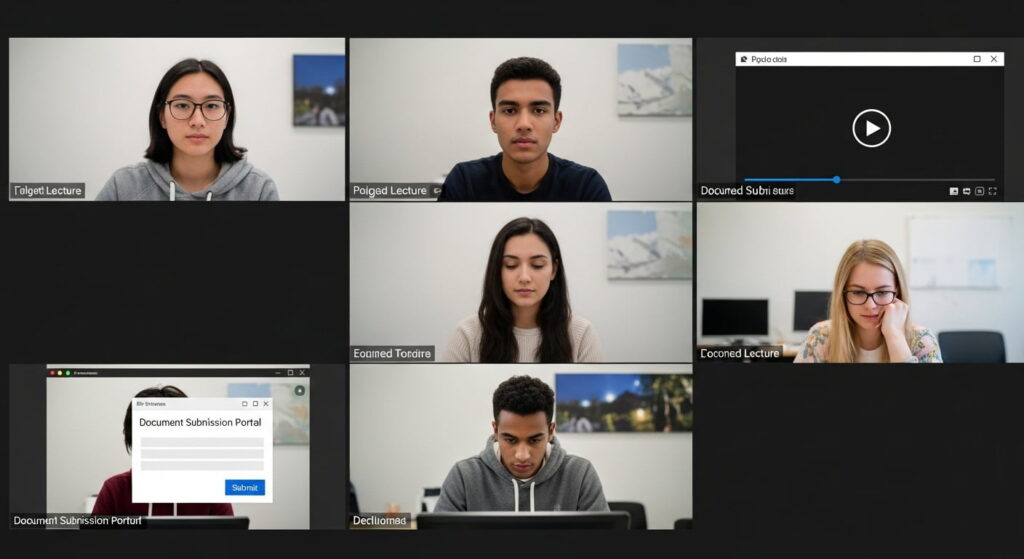Introduction
The University of Georgia (UGA) is one of the most respected public universities in the United States, known for its academic excellence and vibrant campus life. With the growing need for technology in education, UGA has developed a robust online platform called UGA ELC, also known as eLearning Commons. This platform is a central hub where students and instructors can connect, access course materials, submit assignments, and engage in digital learning activities.
In this comprehensive guide, we’ll explore what UGA ELC is, how it works, its key features, benefits for students and faculty, and tips for making the most of this powerful online tool.
What is UGA ELC?

UGA ELC, short for University of Georgia eLearning Commons, is the university’s official learning management system (LMS). It provides a centralized digital space where students and professors can collaborate on academic work. Built on the Brightspace by D2L platform, UGA ELC is designed to make learning more interactive, organized, and accessible.
In simple terms, UGA ELC is the digital classroom for UGA students. Instead of only depending on in-person classes, students can log in to the platform to find everything related to their coursework. Professors also rely on UGA ELC to share announcements, upload lecture slides, create quizzes, and manage grades.
Why UGA ELC is Important
In today’s academic world, digital tools are no longer optional—they are essential. UGA ELC plays a vital role in ensuring that students and instructors stay connected and productive.
Some key reasons UGA ELC is important include:
- Centralized Learning: All course materials are stored in one place.
- Flexibility: Students can access materials anytime and anywhere.
- Efficiency: Instructors can easily grade, track progress, and share feedback.
- Engagement: Discussion boards, quizzes, and announcements keep learning interactive.
- Support for Online and Hybrid Classes: Especially important during times when remote learning is necessary.
How to Access UGA ELC
Accessing UGA ELC is straightforward. Here are the steps for students and instructors:
For Students
- Visit the official UGA ELC website.
- Log in using your MyID and password.
- Once logged in, you’ll see a dashboard with your current courses.
- Select the course you want to view and access its materials.
For Instructors
- Log in using the same process as students.
- From the instructor dashboard, you can manage your courses, upload materials, create assignments, and track student performance.
Tip: It’s best to bookmark the login page for easy access throughout the semester.
Features of UGA ELC

UGA ELC is packed with features that make it more than just a file-sharing site. Let’s break down some of its most useful functions.
1. Course Content
Professors can upload lecture slides, PDFs, readings, and multimedia resources. Students can easily download these materials at any time.
2. Assignments and Quizzes
Assignments can be uploaded directly into the system. Professors can set due dates, and students can track deadlines. Online quizzes and tests can also be administered within the platform.
3. Gradebook
The built-in gradebook keeps students informed about their performance. It provides transparency, so students can track their progress throughout the semester.
4. Announcements
Instructors can post announcements to update students on class changes, upcoming tests, or reminders. These announcements appear on the course homepage.
5. Discussion Boards
A great tool for collaboration, discussion boards allow students to engage with classmates and instructors outside of scheduled class time.
6. Calendar Integration
Important dates, such as deadlines and exams, are highlighted in the course calendar. This feature helps students stay organized.
7. Multimedia Support
UGA ELC supports videos, audio recordings, and interactive content. This ensures that learning goes beyond static documents.
Benefits of UGA ELC for Students
The platform is built with student success in mind. Here are some of the top benefits:
- 24/7 Access to Materials: Whether you’re on campus, at home, or traveling, you can always access your coursework.
- Improved Organization: Everything is stored in one place, reducing the risk of missing assignments or deadlines.
- Enhanced Communication: Students can directly message professors or participate in class-wide discussions.
- Self-Paced Learning: With recorded lectures or uploaded materials, students can revisit content anytime they need clarification.
- Grade Tracking: The gradebook function helps students understand their standing in the class without waiting until the end of the semester.
Benefits of UGA ELC for Instructors
Just as students benefit, instructors also gain from using UGA ELC:
- Efficiency in Grading: The online gradebook saves time and provides transparency.
- Easy Content Distribution: Uploading and updating course materials is simple.
- Analytics and Tracking: Professors can see how often students access materials, which helps identify engagement levels.
- Flexible Teaching: Instructors can manage in-person, hybrid, or fully online courses with the same system.
- Student Communication: Announcements, messaging, and discussion boards streamline communication.
UGA ELC and Online Learning

The rise of online learning has made systems like UGA ELC essential. When the COVID-19 pandemic shifted classes online, platforms like ELC became the lifeline for universities worldwide.
Even now, with more classes back on campus, UGA ELC continues to be a core part of learning because:
- Many students prefer hybrid models.
- Online submissions reduce paperwork.
- Recorded lectures and digital notes support different learning styles.
- Students who miss class can still catch up.
Tips for Students to Use UGA ELC Effectively
To make the most of UGA ELC, students should keep the following tips in mind:
- Check Announcements Daily: Stay updated on course changes.
- Use the Calendar Feature: Keep track of deadlines and plan ahead.
- Engage in Discussions: Active participation boosts learning and shows engagement.
- Download Materials Regularly: Save important files in case of technical issues.
- Track Grades Frequently: Monitor your progress and seek help if needed.
- Set Notifications: Enable email or mobile alerts for updates.
Tips for Instructors Using UGA ELC
For instructors, using UGA ELC effectively can improve both teaching and student outcomes. Here’s how:
- Organize Content Clearly: Use modules and folders for easy navigation.
- Post Regular Announcements: Keep students engaged and informed.
- Provide Feedback Promptly: Use the grading tools to give students constructive feedback.
- Use Multimedia: Incorporate videos, quizzes, and interactive activities to enhance learning.
- Track Engagement: Monitor student activity to identify those who may need extra support.
Common Challenges and Solutions in UGA ELC
Like any digital platform, UGA ELC comes with challenges. Here are a few common ones and how to overcome them:
- Login Issues: If you have trouble logging in, reset your password through MyID or contact UGA’s IT support.
- File Upload Errors: Ensure your files are in the correct format (PDF, Word, etc.) and not too large.
- Navigation Confusion: Familiarize yourself with the dashboard and course modules early in the semester.
- Missed Notifications: Enable email or mobile alerts to stay updated.
UGA ELC and Mobile Access

Many students prefer accessing coursework through their phones. The good news is that UGA ELC is mobile-friendly. You can access it through your mobile browser, and Brightspace Pulse (the companion app) makes it even easier to keep track of assignments and announcements on the go.
Future of UGA ELC
The future of learning management systems like UGA ELC looks promising. With growing demand for flexible education, UGA is likely to expand its digital resources further. Possible future improvements may include:
- More AI-powered tools for personalized learning.
- Enhanced multimedia integration for immersive experiences.
- Better analytics to help instructors support struggling students.
- Expanded mobile features for seamless learning anywhere.
Conclusion
UGA ELC is more than just a digital tool—it’s the backbone of modern learning at the University of Georgia. By centralizing course materials, improving communication, and offering flexible learning options, it has become an indispensable resource for both students and faculty.
Whether you’re a freshman navigating your first semester or a professor teaching an advanced graduate course, UGA ELC ensures that education is organized, accessible, and engaging. With proper use, this platform not only enhances learning but also prepares students for success in a technology-driven world.
